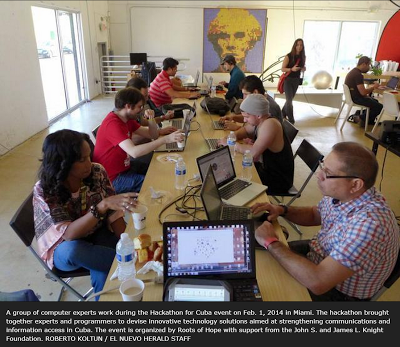Cuba USA
There will be a two day Hackathon for Cuba in Miami starting with a reception the evening of January 31 and getting down to work on February first. (The event is organized by the Miami Beach-based nonprofit Roots of Hope and with funding from the John S. and James L. Knight Foundation and they hope to repeat it in New York and San Francisco.)
The Hackathon goal is to develop prototype programs that are well suited to Cuba -- software for a nation with slow, expensive wire-line connectivity and second generation cell phone infrastructure.
For example, there are smart phones in Cuba. They cannot be used for modern Internet access, but they can be used as stand-alone computers, perhaps connected to external peripherals. The Hackathon might produce some innovative stand alone applications for smartphones.
We might also see applications tailored to Cuba'a slow, $5 per hour Internet connectivity -- for example, programs to facilitate creating and replying to email or other messages offline and uploading and downloading them in compressed batches.
Regardless, since necessity is the mother of invention, we can hope for innovations that would be useful in Cuba or any other nation with poor Internet infrastructure. We might even see some novel solutions for busy executives travelling in "airplane mode."
I have argued in other posts, for example here and here, that the Cuban government's limited access policy is causing missed opportunities. (Cuban leaders understood this cost long ago).
The Hackathon for Cuba is a good thing, but I wish it were in Havana rather than Miami.
-----
Update 1/31/2014
The Washington Post has an article on the Hackathon.
 -----
-----
Update 2/4/2014
You can read the Hackathon coverage by the Miami Herald and WLRN TV.
The ground rules were that all entries had to be legal in both the US and Cuba, which led to the disqualification of a satellite-based entry.
The winners were email-based systems to use Twitter and to retrieve material from Wikipedia and the Web and a WiFi access point built around a Raspberry Pi.
Those email-based systems are a throwback to the earliest days of the Internet. One of the oldest, continuously operated email retrieval services is Bit-l, which has been run by Ing. Jorge Espresate X. at Infomed in Cuba for many years.
The good news from the Hackathon is that it has produced some interesting ideas. The bad news is that they are for tecnology that is obsolete in most of the world -- another indication of the price Cuba has paid for its antiquated Internet.
 -----
-----
Update 2/8/2014
Christina, from Choose Digital, participated in the Hackathon and gives her impression and describes her app in this blog post.

-----
Update 4/7/2015
The next Roots of Hope hackathon for Cuba will be held at Facebook headquarters April 25 and 26th. Submissions may be hardware or software applications that can be launched in Cuba to facilitate (1) connectivity/access to information, (2) entrepreneurship and (3) journalism and digital advocacy. There will be $7,000 in prize money.
-----
Update 5/13/2015
Roots of Hope has begun Startups Cuba to assist and encourage Cuban entrepreneurs

-----
Update 2/23/2016
One of the winners of the Miami Hackathon for Cuba two years ago was an email-based system for retrieving Wikipedia articles. It is now available as a Web service called Apretaste. (I don't get the name).
Apretaste is simple and legal -- you send an email with the subject line WIKIPEDIA <search term> to [email protected] and the server returns the Spanish Wikipedia article. If it is an ambiguous term, like Castro, it returns the Wikipedia disambiguation page.
This is better than nothing, but it is sad that Cubans have to use such cumbersome 1980s technology to access a tiny slice of the Internet.
- A High-level Us Delegation Is In Havana To Discuss Telecommunication And The Internet
I hope Cuba's policy is not shaped by political fear or the desire to protect government/ETECSA revenue and that the US delegation is not trying to influence Cuban politics or maximize the profit of US telecommunication companies. Conrad Tribble,...
- A Drop In The Internet Bucket -- Big News Or Not?
Adonis Ortiz chats with his father, who lives in the U.S., using a free Wi-Fi network at a center run by famed artist Kcho, in Havana, (Desmond Boylan/Associated Press) The Cuban artist Kcho received permission from the Cuban telecommunication monopoly...
- Can There Be A Uniquely Cuban Internet?
I don't criticize to knock the system down. On the contrary, I criticize to perfect the system. Cuban blogger Carlos Alberto Pérez The first instance of citizen journalism on the Internet was during the Soviet Coup attempt of 1991, where it was used...
- Is The Internet A Priority For Cuba? The Ball Is In Their Court.
Yesterday, a reporter asked me to comment on two quotes following the release of Alan Gross: 1. President Obama: "Unfortunately, our sanctions on Cuba have denied Cubans access to technology that has empowered individuals around the globe." 2. Senator...
- Etecsa Officials Provide Some Details And Make Some Promises
Etecsa officials held a press conference in which they made the point that the 118 new Internet access rooms are just the start of improved Internet service. They promised lower prices, more access rooms, WiFi in access rooms, mobile connectivity, etc.,...
Cuba USA
The Hackathon for Cuba -- in Miami, not Havana
There will be a two day Hackathon for Cuba in Miami starting with a reception the evening of January 31 and getting down to work on February first. (The event is organized by the Miami Beach-based nonprofit Roots of Hope and with funding from the John S. and James L. Knight Foundation and they hope to repeat it in New York and San Francisco.)
The Hackathon goal is to develop prototype programs that are well suited to Cuba -- software for a nation with slow, expensive wire-line connectivity and second generation cell phone infrastructure.
For example, there are smart phones in Cuba. They cannot be used for modern Internet access, but they can be used as stand-alone computers, perhaps connected to external peripherals. The Hackathon might produce some innovative stand alone applications for smartphones.
We might also see applications tailored to Cuba'a slow, $5 per hour Internet connectivity -- for example, programs to facilitate creating and replying to email or other messages offline and uploading and downloading them in compressed batches.
Regardless, since necessity is the mother of invention, we can hope for innovations that would be useful in Cuba or any other nation with poor Internet infrastructure. We might even see some novel solutions for busy executives travelling in "airplane mode."
I have argued in other posts, for example here and here, that the Cuban government's limited access policy is causing missed opportunities. (Cuban leaders understood this cost long ago).
The Hackathon for Cuba is a good thing, but I wish it were in Havana rather than Miami.
-----
Update 1/31/2014
The Washington Post has an article on the Hackathon.

Update 2/4/2014
You can read the Hackathon coverage by the Miami Herald and WLRN TV.
The ground rules were that all entries had to be legal in both the US and Cuba, which led to the disqualification of a satellite-based entry.
The winners were email-based systems to use Twitter and to retrieve material from Wikipedia and the Web and a WiFi access point built around a Raspberry Pi.
Those email-based systems are a throwback to the earliest days of the Internet. One of the oldest, continuously operated email retrieval services is Bit-l, which has been run by Ing. Jorge Espresate X. at Infomed in Cuba for many years.
The good news from the Hackathon is that it has produced some interesting ideas. The bad news is that they are for tecnology that is obsolete in most of the world -- another indication of the price Cuba has paid for its antiquated Internet.

Update 2/8/2014
Christina, from Choose Digital, participated in the Hackathon and gives her impression and describes her app in this blog post.

-----
Update 4/7/2015
The next Roots of Hope hackathon for Cuba will be held at Facebook headquarters April 25 and 26th. Submissions may be hardware or software applications that can be launched in Cuba to facilitate (1) connectivity/access to information, (2) entrepreneurship and (3) journalism and digital advocacy. There will be $7,000 in prize money.
-----
Update 5/13/2015
Roots of Hope has begun Startups Cuba to assist and encourage Cuban entrepreneurs
StartUp Cuba, an initiative of Roots of Hope, seeks to empower entrepreneurs in Cuba by providing them with access to educational resources and mentoring as they launch and grow their businesses. We provide workshops and seminars for early stage entrepreneurs, as well as fellowships outside of Cuba for experienced business owners.They hope to award fellowships to and hold workshops for Cuban entrepreneurs, but, judging from their Web site, they are just starting up.

-----
Update 2/23/2016
One of the winners of the Miami Hackathon for Cuba two years ago was an email-based system for retrieving Wikipedia articles. It is now available as a Web service called Apretaste. (I don't get the name).
Apretaste is simple and legal -- you send an email with the subject line WIKIPEDIA <search term> to [email protected] and the server returns the Spanish Wikipedia article. If it is an ambiguous term, like Castro, it returns the Wikipedia disambiguation page.
This is better than nothing, but it is sad that Cubans have to use such cumbersome 1980s technology to access a tiny slice of the Internet.
- A High-level Us Delegation Is In Havana To Discuss Telecommunication And The Internet
I hope Cuba's policy is not shaped by political fear or the desire to protect government/ETECSA revenue and that the US delegation is not trying to influence Cuban politics or maximize the profit of US telecommunication companies. Conrad Tribble,...
- A Drop In The Internet Bucket -- Big News Or Not?
Adonis Ortiz chats with his father, who lives in the U.S., using a free Wi-Fi network at a center run by famed artist Kcho, in Havana, (Desmond Boylan/Associated Press) The Cuban artist Kcho received permission from the Cuban telecommunication monopoly...
- Can There Be A Uniquely Cuban Internet?
I don't criticize to knock the system down. On the contrary, I criticize to perfect the system. Cuban blogger Carlos Alberto Pérez The first instance of citizen journalism on the Internet was during the Soviet Coup attempt of 1991, where it was used...
- Is The Internet A Priority For Cuba? The Ball Is In Their Court.
Yesterday, a reporter asked me to comment on two quotes following the release of Alan Gross: 1. President Obama: "Unfortunately, our sanctions on Cuba have denied Cubans access to technology that has empowered individuals around the globe." 2. Senator...
- Etecsa Officials Provide Some Details And Make Some Promises
Etecsa officials held a press conference in which they made the point that the 118 new Internet access rooms are just the start of improved Internet service. They promised lower prices, more access rooms, WiFi in access rooms, mobile connectivity, etc.,...
